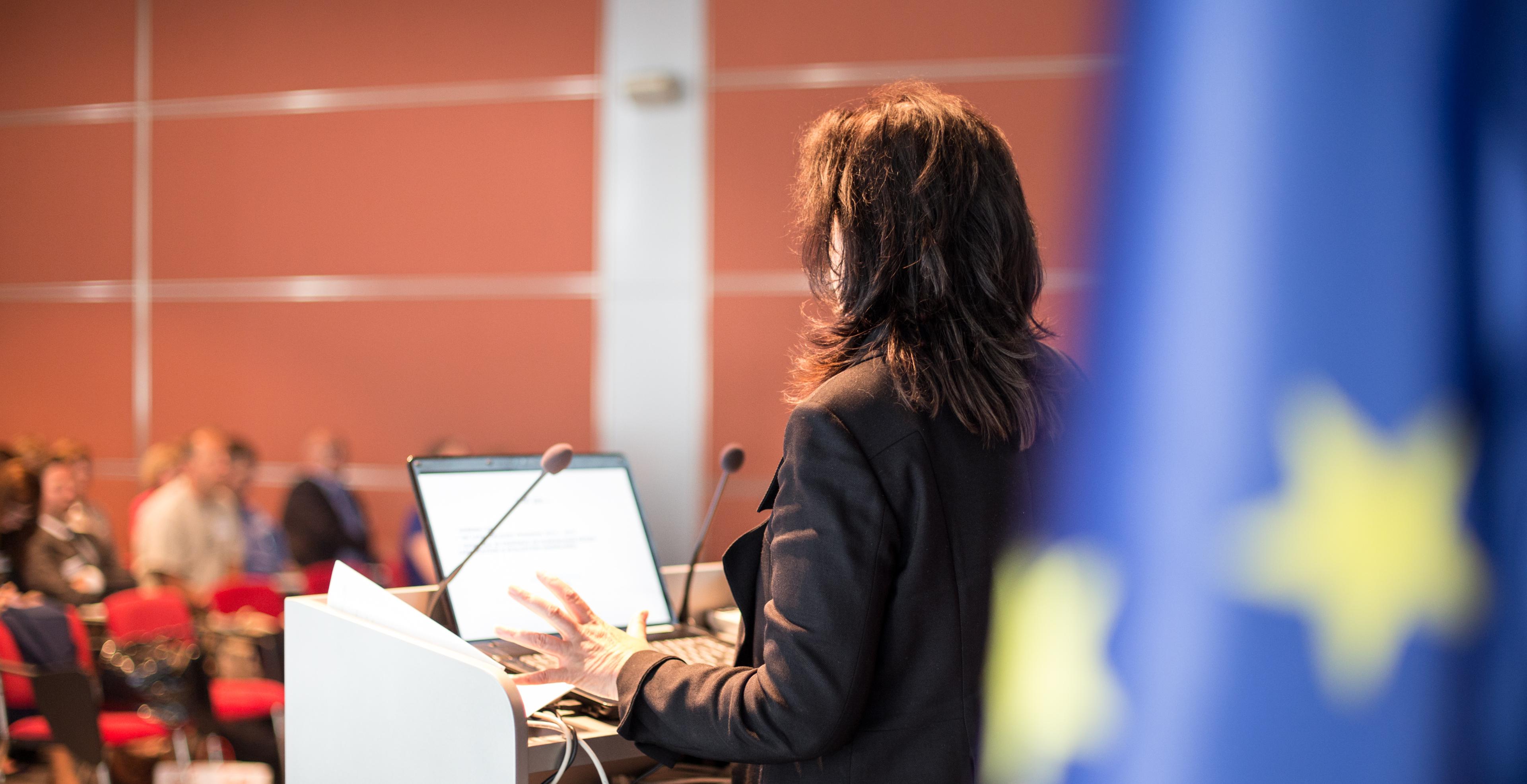The EU institutions and bodies: glossary
The EU system is based on treaties between its member states. The foundations were laid in 1951 with the creation of the European Coal and Steel Community. What is special about the classic international treaty between six Member States (Germany. France, Italy, Belgium, Luxembourg and the Netherlands) consisted of the creation of joint institutions (High Authority, later renamed Commission; Parliamentary Assembly, later the European Parliament; Council of Ministers; Court of Justice) who could act on behalf of the Community. In 1957, the Treaties of Rome (Treaties establishing the European Economic Community (EEC) and the European Atomic Energy Community) added further Communities, whose powers were subsequently expanded step by step. In 1992, the founding treaties in Maastricht were put on a new footing with the Treaty on European Union. This came into effect in 1993 and, together with the Treaty on the Functioning of the European Union, forms the basis of international law for the EU. Further adjustments followed in the Treaties of Amsterdam (1997) and Nice (2001) and most recently in 2007 by the Treaty of Lisbon, which entered into force on 1 December 2009. Currently, under the Treaty on European Union (TEU), there are seven institutions:

The European Commission
The European Commission is based in Brussels. It is the politically independent executive and administrative body of the European Union (EU) and has the right to make proposals for new European laws (right of initiative). In addition, the Commission, as the 'guardian of the Treaties', is responsible for their implementation, monitors the application and compliance with EU law, manages the Union's budget and negotiates international agreements.
The Commission is headed by the President of the Commission and the College of Commissioners . It is composed of one Commissioner from each Member State. The President of the Commission and the Commissioners are appointed for a five-year term on the basis of a multi-stage procedure, acting by a qualified majority of the Council and obtaining the consent of the European Parliament. The current president is Ursula von der Leyen. It chairs the weekly meetings of the Commission and assigns responsibility to each member for a policy area, the so-called Directorate-General. Each Commissioner is assisted by a cabinet of staff. The Commission's administrative structure is made up of some 60,000 officials in directorates-general, services, offices and agencies.
The European Parliament
The European Parliament is the only EU institution whose members are directly elected by the citizens of the Member States in the European elections held every five years. Different electoral systems apply depending on the country. The number of MEPs per country depends on the size of the population, with no country having fewer than six or more than 96 MEPs. Within the Parliament, MEPs can form transnational groups that reflect different political orientations.
Since the first direct elections in 1979, the European Parliament has been given more and more powers. Together with the Council of the European Union, it is now primarily responsible for European legislation within the framework of the ordinary legislative procedure (legislative function). It cannot legislate on its own, but almost nothing can be decided without Parliament. In addition, MEPs decide on the EU budget together with the Council (budgeting function), elect the President of the European Commission and the Commission as a whole (electoral function) and scrutinise the other EU institutions, for example by setting up committees of inquiry.
Parliament is presided over by a president, who is re-elected after two and a half years (halfway through the legislature). He or she represents the Parliament before the other EU institutions and the outside world. The European Parliament meets both in Strasbourg and in Brussels.
The Council of the European Union (Council of Ministers)
The Council of the European Union, based in Brussels, meets in Brussels or Luxembourg and represents the governments of the EU member states. Together with the European Parliament, it is primarily responsible for legislation. The Council does not have permanent members, as each member state sends the minister(s) responsible for the issue, depending on the policy area. In this way, ten different Council configurations come about. There is, for example, the "Foreign Affairs Council", which is made up of the foreign ministers of the member states, or the "Council for the Environment" with the environment ministers. Despite this diversity, however, the Council is only one institution. In a rotation procedure, each EU country assumes the presidency of the Council for six months at a time. The Council's internal voting procedures are quite complex and can change depending on the policy area involved. In principle, a distinction can be made between unanimous decisions and those with qualified majority and simple majority, although the latter are now an exception. In the case of qualified majority voting, the Treaty of Lisbon has provided for the principle of double majority voting since 2017. 55 per cent of member states, representing at least 65 per cent of the EU's population, must agree to a decision in order for it to take place. Around 80 % of all EU legislation is adopted under this procedure.
The European Council
The European Council is composed of the Heads of State or Government of the EU Member States and the President of the European Commission. It sets out the EU's overall policy orientations, guidelines and priorities. The meetings – at least two per six months – are also known as EU summits. As a rule, the European Council's decision-making is based on consensus, but in practice several problem areas are often stirred up into negotiating packages. At the head of the European Council is the President or the. She/He is elected by the European Council for a two-and-a-half-year term and can be re-elected once.

The European Central Bank
The European Central Bank (ECB) has officially become an institution of the EU with the Treaty of Lisbon. It is based in Frankfurt am Main and is the central bank of the EU member states that adopted the euro. The ECB shapes the EU's monetary policy and is tasked with ensuring that the price level remains stable. It also carries out foreign exchange operations, manages the official foreign reserves of the Member States and issues euro notes and coins.
The ECB is composed of the Executive Board, the Governing Council and the General Council, which is made up of the governors of the national central banks of all EU Member States. The ECB is independent and not bound by any instructions. To ensure that this remains the case, the members of the Executive Board are appointed for a term of eight years and can only be appointed once.
The Court of Justice of the European Union
Since the Treaty of Lisbon, the Court of Justice of the European Union, based in Luxembourg, has encompassed the overall structure of the jurisdiction of the European Union. It interprets EU law and ensures that it is applied in the same way in all EU countries. In addition to the European Court of Justice (ECJ), it consists of the General Court of the European Union (CJEU).
The Court of Justice (CJEU) is the court of last resort in all legal matters relating to the Union, actions brought by Member States or institutions, disputes between governments of the Member States and EU institutions, and conflicts within the EU. It consists of one judge per EU country and nine advocates general. They are appointed by national governments for a term of six years and can be re-elected. The Court of Justice is presided over by the President and Vice-President, who are elected by the Judges for a term of three years. The ECJ is obliged to be fully multilingual. This means that any official language of the Union can be the language of the proceedings and has the same status.
The General Court (CJEU) is subordinate to the Court of Justice and has jurisdiction in particular to hear actions brought by private individuals and in cases relating to unfair competition between undertakings.
The Court of Auditors
The European Court of Auditors, based in Luxembourg, verifies that the EU's revenue and expenditure are being used correctly. As an independent audit body , it contributes to the improvement of EU financial management and represents the interests of European taxpayers. The members of the Court of Auditors are proposed by the Member States (one member per State) and appointed by the Council of Ministers; their term of office is six years with the possibility of renewal. The members elect a president from among themselves for a period of three years. In the event of fraud or irregularities, the European Court of Auditors itself cannot take legal action. In such cases, he must inform the European Anti-Fraud Office (OLAF).

